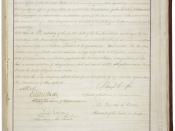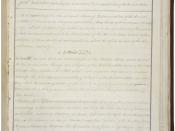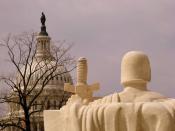Rachel Miller
Essay
The framers of the Constitution were coming out of a monarchy, where a king had all of the power. Realizing that this was not a good system, they wanted to have a more balanced government. The founders desired a government that represented the people, protected the property rights of citizens, and put limits on the power of the central government. These principles were put into the making of the United States Constitution. The government of the United States today continues to practice the principles of the Constitution, which was framed by our Founding Fathers.
The first desire was to form a republican government that represented the people. The United States Congress, made up of the House of Representatives and the Senate, is a powerful group of law makers that are elected by the people. The U.S. Congress has the authority to make laws and declare war.
Also, they have the right to confirm or reject Presidential appointments and they have the power to investigate potential crimes. There are four hundred thirty-five members of the House of Representatives and one hundred members of the Senate. The American citizens, through their right to vote, have the power to elect these members of Congress, which shows that we have the ability to influence our government.
The framers of the Constitution also wanted a government that protected the property rights of citizens. These property rights were decided by common law judges. These judges would settle issues between the citizens by using reason and fairness. The laws of property are to respect and equal the rights of all the citizens. James Madison once said, "As a man is said to have a right to his property, he may be equally said to have a property to his rights." Our rights are...


